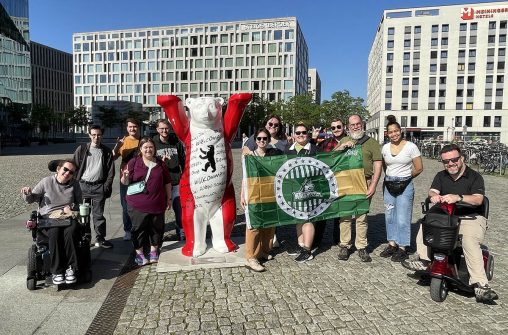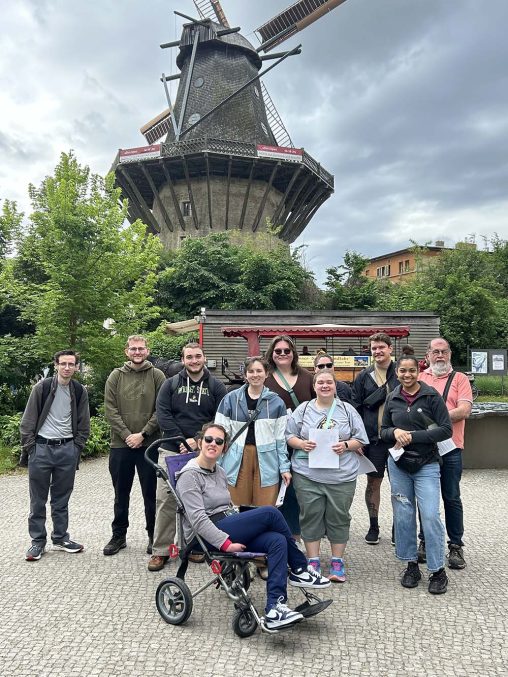
A group of Wright State students, including four who identify as being disabled, participated in a study abroad trip to Berlin, where they assessed the city’s accessibility standards.
A resurgence of Wright State University students has spent time abroad this summer studying arts, culture, engineering and language, but a few visited Berlin for something quite a bit different yet equally important: disability access.
Tom Webb, associate vice president of accessibility, led students in his Community Accessibility course around Berlin to compare accessibility standards, architecture and features in the United States to those in Germany.
Webb co-led the Berlin trip with Gary Schmidt, Ph.D., dean of the College of Liberal Arts and professor of German. Their group totaled 10 students, four of whom identify as being disabled.
At Wright State, Webb’s course looks at the architectural designs of local and regional businesses. In Berlin, the students started by studying their hotel, which was generally accessible and then getting a feel for the city and how Berliners interacted with them.
“It’s definitely one of the more accessible European countries,” Webb said of Germany. “It’s far ahead of others. About 85 percent of public transportation is accessible. But some cars and buses were inaccessible, and we had to wait longer than usual for buses and trains.”
However, the group discovered that restaurants that claimed to be accessible were not quite so. Some had steps leading inside, and to accommodate those in wheelchairs, staff pulled out a stored portable ramp, but not all had that option.
Webb, who has cerebral palsy and uses a mobility scooter, said a drawback to mobility in the city was the absence of curb cuts.
He said in Berlin “a lot of people who used mobility devices had large wheels to get over the curb,” which puts the onus of getting around on the disabled person.
The group was also unable to access the museum next to the historic site called Checkpoint Charlie, which had been the best-known crossing site in the Berlin Wall during the Cold War. Instead, the students visited Topography of Terror, a nearby museum that was completely accessible.
Lily Berkow, a junior social work major who uses a powered wheelchair and has cerebral palsy, was accompanied on the trip by her father, Steven, as her personal assistant (PA). She said that Berliners seemed to want to help and were respectful.
“They always talked to me first rather than my personal assistant, even though I don’t speak German,” she said. “They often apologized for the inconvenience and would go out of their way to show me how to navigate where I need to go. I felt that a lot of the people who helped me really wanted to be inclusive.”
Berkow continued: “Berlin’s buildings, transportation system and sidewalks sometimes made me feel like a second-class citizen, but Berliners never did. I found them to be very respectful of my differences. In contrast to my experiences in the U.S., I never felt like someone was staring at me nor talking to my PA like I wasn’t there.”

Lily Berkow, a junior social work major who uses in a powered wheelchair, encouraged students all of abilities to participate in Wright State’s study abroad program.
Webb described the trip as successful. “When things weren’t accessible, the Germans were good to find ways to make it so,” he said.
Webb is co-author of “Universal Design in Study Abroad Creating Inclusive Educational Travel Opportunities for Students with Disabilities,” which higher education professionals use as a guidebook for creating inclusive study abroad trips for students with disabilities.
This was the first time Wright State disabled students were able to participate in a study abroad trip since 2018. Webb welcomed the return of study abroad opportunities for students with disabilities, especially for Berkow.
“She’s been trying to do this for three years,” he said. “We’re always looking for ways to get students engaged.”
Studying abroad benefits all students, but in particular, it gives those who are disabled a valuable experience and a sense of independence, Webb said.
“It empowers them because they return more confident from being in an environment where you don’t know the language or can’t easily navigate, but you figure it out on the spot. That’s problem-solving skills,” he said.
Berkow encourages others to travel abroad.
“Don’t let a handicap or disability stop you. People there are encouraging and supporting and don’t see having a disability as being an impediment,” she said.
Berkow praised Wright State for making the trip possible.
“A lot of times people with disabilities are discouraged,” she said, “but Wright State has a can-do attitude.”

 Wright State student-athletes make a lasting impact on local family, more to come
Wright State student-athletes make a lasting impact on local family, more to come  Wright State names Rajneesh Suri dean of Raj Soin College of Business
Wright State names Rajneesh Suri dean of Raj Soin College of Business  ‘Only in New York,’ born at Wright State
‘Only in New York,’ born at Wright State  Wright State president, Horizon League leaders welcome new commissioner
Wright State president, Horizon League leaders welcome new commissioner  Wright State celebrates homecoming with week-long block party
Wright State celebrates homecoming with week-long block party 